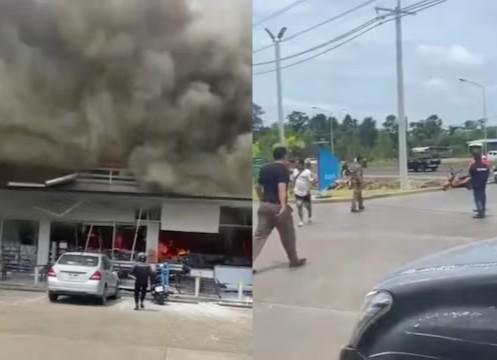
Hope Thailand & Cambodia will take measures for a cessation of hostilities: India
India has expressed its concern over the ongoing border clashes between Thailand and Cambodia, urging both countries to take measures to de-escalate the situation and prevent further escalation. The Indian government has been “closely monitoring” the situation, said Ministry of External Affairs (MEA) spokesperson Randhir Jaiswal, emphasizing the importance of maintaining peace and stability in the region.
The border clashes between Thailand and Cambodia have been ongoing for several days, with both sides accusing each other of violating their shared border. The tensions escalated after a group of Thai soldiers entered a disputed area near the Preah Vihear temple, a UNESCO World Heritage Site, which is claimed by both countries. The Cambodian military responded with artillery fire, leading to a series of skirmishes and exchanges of gunfire.
The situation has raised concerns among regional powers, including India, which has close and friendly relations with both Thailand and Cambodia. The Indian government has been working to promote regional cooperation and stability, particularly through its engagement with the Association of Southeast Asian Nations (ASEAN).
The MEA spokesperson’s statement echoed India’s long-standing commitment to promoting peace and stability in the region. “India has close and friendly relations with both countries and hopes that both sides will take measures for a cessation of hostilities and prevention of further escalation,” Jaiswal said.
India’s concerns about the situation are not limited to the immediate conflict. The country has a significant stake in the region’s stability, given its long history of economic and cultural ties with Thailand and Cambodia. India has been actively engaged in promoting regional cooperation, particularly through its participation in ASEAN, which has been critical in promoting peace and stability in the region.
The ASEAN Regional Forum (ARF), which India is a part of, has been playing a key role in promoting regional security and stability. The ARF has been working to promote conflict prevention and resolution, as well as to strengthen regional cooperation on issues such as terrorism, transnational crime, and maritime security.
India’s efforts to promote regional stability are also being driven by its growing economic ties with the region. Thailand and Cambodia are both major trade partners for India, and the country has been working to strengthen its economic ties with the region through various initiatives, including the India-ASEAN Free Trade Agreement.
The Indian government’s statement is also reflective of its commitment to promoting the values of peace and diplomacy. India has long been a proponent of peaceful resolution of conflicts, and has been working to promote regional cooperation and dialogue to resolve disputes.
The situation on the border between Thailand and Cambodia is complex and sensitive, with both sides having legitimate claims to the disputed territory. The Indian government’s call for a cessation of hostilities and prevention of further escalation is a pragmatic approach that recognizes the need for a peaceful resolution of the conflict.
In conclusion, India’s statement on the border clashes between Thailand and Cambodia is a timely and relevant response to the situation. The country’s call for a cessation of hostilities and prevention of further escalation is a reflection of its commitment to promoting peace and stability in the region, as well as its desire to maintain good relations with both Thailand and Cambodia.
As the situation continues to unfold, it is imperative that both sides engage in meaningful talks to resolve their differences peacefully. The international community, including India, must continue to play a constructive role in promoting a peaceful resolution to the conflict. The Indian government’s statement is a welcome step in this direction, and it is hoped that both Thailand and Cambodia will take measures to de-escalate the situation and prevent further escalation.



